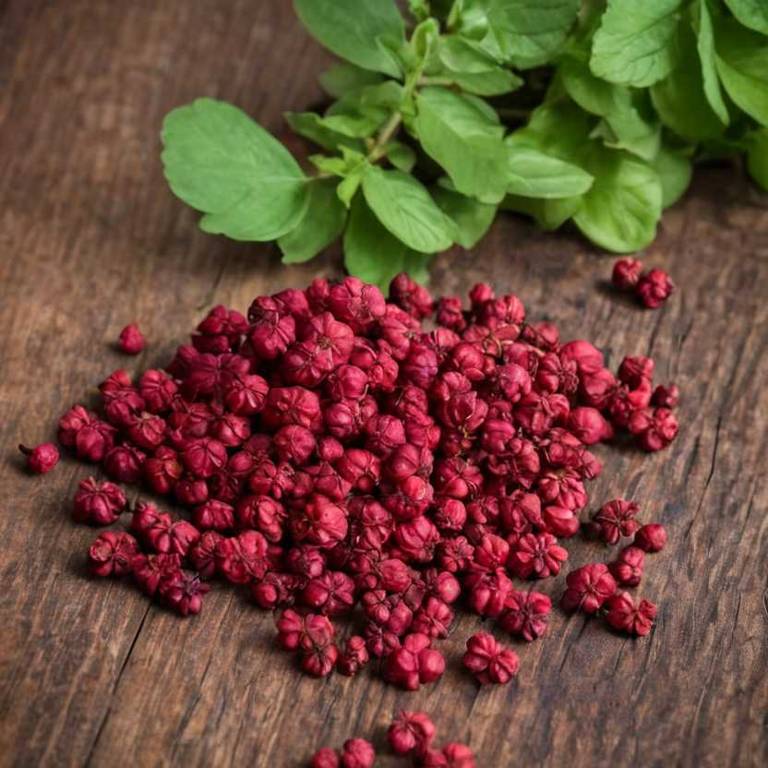Chinese Magnolia Vine (Schisandra chinensis)
Chinese Magnolia Vine (Schisandra chinensis) is a member of the Schisandraceae family, native to China, Russia, and Korea. Traditionally, its fruits, bark, and resin have been used for decoctions, infusions, and tinctures.
This herb is particularly valued for its tonic, bitter, and stimulant actions, and has a long history of use in traditional chinese medicine, japanese kampo medicine, and korean traditional medicine.

Quick Facts / Key Information
| Common Name | Chinese Magnolia Vine |
|---|---|
| Scientific Name | Schisandra chinensis |
| Plant Family | Schisandraceae |
| Genus | Schisandra |
| Species | chinensis |
| Native Range | China, Russia, Korea |
| Plant Parts Used | Fruits, Bark, Resin |
| Primary Medicinal Actions | Tonic, Bitter, Stimulant |
| Primary Traditional Systems | Traditional Chinese Medicine, Japanese Kampo Medicine, Korean Traditional Medicine |
| Historical Preparation Methods | Decoction, Infusion, Tincture |
Botanical Identity
- Scientific Name
- Schisandra chinensis
- Common Name
- Chinese Magnolia Vine
- Synonyms / Alternative Names
- Five-Fruit Vine, Schisandra Berry, Five-Flavor Berry
- Plant Family
- Schisandraceae
- Genus
- Schisandra
Botanical Description
- Growth Habit
- Perennial herbaceous plant.
- Height
- It typically grows to a height of 5 to 15 meters.
- Leaves
- Lanceolate leaves with a glossy dark green upper surface and a lighter green lower surface, featuring prominent stomatal bands along the midrib.
- Flowers
- Flowers are solitary, actinomorphic, with five white petals and five yellow stamens arranged in a single whorl
- Stems
- Cylindrical, woody stems with opposite branching, smooth surface, and persistent buds.
Traditional Uses / Historical Use
Traditional Systems
- Traditional Chinese Medicine
- Japanese Kampo Medicine
- Korean Traditional Medicine
Historical Preparation Methods
- Decoction
- Infusion
- Tincture
- Powder
Medicinal Actions
- Tonic
- Historically regarded as a gentle tonic, for long-term use contexts.
- Bitter
- Commonly referenced as a mild bitter, in taste-driven classifications.
- Stimulant
- As described in traditional systems, a moderate stimulant, in energy-related contexts.
- Anti-inflammatory
- In herbal literature, noted as a warming anti-inflammatory, for general calming applications.
Active Compounds
- Flavonoid
- Naturally occurring polyphenols that contribute to pigmentation and structural chemistry.
- Glycoside
- Secondary metabolites formed through glycosylation processes in plants.
- Terpenoid
- A chemical class commonly associated with volatile plant constituents.
- Tannin
- A group of compounds frequently present in plant tissues exposed to herbivory.
Modern Research Overview
This section is reserved for future summaries of scientific research related to this plant. As additional verified sources are reviewed, relevant study information will be added here.
Safety & Contraindications
- General Precautions
- Some general precautions have been associated with the use of this herb.
- Contraindications
- Some conditions have been cited as contraindications for the use of this herb.
- Allergies
- There is insufficient evidence to determine whether this herb commonly causes allergic reactions.
- Drug Interactions
- The potential for interactions with prescription medications has not been extensively studied.
- Toxicity
- There is insufficient evidence to determine the toxic potential of this herb.
- Pregnancy & Breastfeeding
- Available information regarding use during pregnancy or breastfeeding is limited.
Preparation & Usage Methods
- Infusion
- Dried or fresh plant parts are infused in hot water and consumed as a beverage.
- Decoction
- Decoctions are made by heating plant material in water for an extended time.
- Poultice
- A topical preparation made by applying softened plant material externally.
- Tincture
- Alcohol is used as a solvent to extract plant constituents over time.
- Powder
- Dried plant material is ground into a fine powder.
Growing, Harvesting & Storage
Growing / Cultivation
- Soil
- Prefers loamy soil with well-drained conditions. Typically grows best in organically rich soils.
- Sunlight
- Thrives in partial shade. Tolerates partial shade to full shade.
- Watering
- Prefers well-balanced moisture levels. Tolerates moderate moisture fluctuations.
Medical Disclaimer
The information provided on this page is for educational and informational purposes only. It is not intended to diagnose, treat, cure, or prevent any medical condition. Always consult a qualified healthcare professional before using any herb for medicinal purposes.